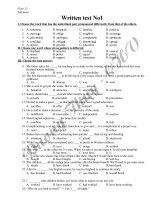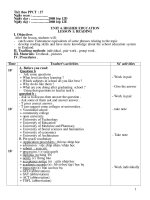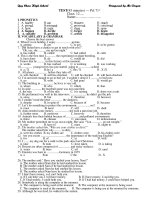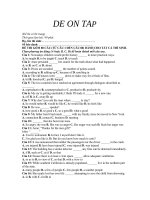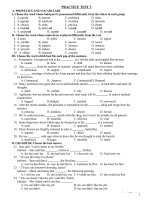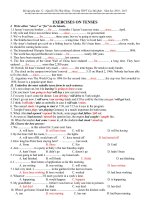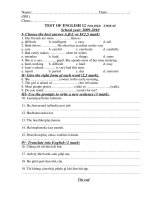ktra ta 12
Bạn đang xem bản rút gọn của tài liệu. Xem và tải ngay bản đầy đủ của tài liệu tại đây (97.37 KB, 2 trang )
<span class='text_page_counter'>(1)</span>Name: ……………………………………. TEST: ENGLISH 12. Class: ……………………………………. Time: 45’ (No.1). I. Choose the word whose underlined part is pronounced differently from the others (1pt) 1. A. chores. B. chair. C. child. D. chemistry. 2. A. failed. B. absorbed. C. solved. D. reached. 3. A. chores. B. dishes. C. houses. D. coaches. 4. A. plates. B. students. C. friends. D. looks. 5. A. wondered. B. laughed. C. replied. D. cleaned. II. Choose the most suitable word or phrase to complete each of the following sentences. (2pts) 6. Children need a ……………………..environment in their families. A. careful B. care C. caring D. careless 7. My ………………….in the family is helping my younger brother with his study. A. task B. activity C. job D. responsibility 8. Our grandparents and parents often give us good …………………….on important matters. A. ideas B. advice C. examples D. thoughts 9. The house looks so nice. Its owner must have a …………………..nature. A. romance B. romantic C. romanized D. romantically 10. After ten years of ……………………….they got divorced. A. marriage B. friendship C. work D. love 11. Women are still struggling for true ………………….with men. A. equality B. similarity C. balance D. sameness 12. Physical ………………………sometimes blinds us. A. attractiveness B. attract C. attractive D. attractively 13. A woman has to ……………….more in marriage than a man. A. determine B. sacrifice C. apologize D. equalize III. Put the verbs in correct tenses (2pts) 14. They (wash)…………………. the floor every week and they (do)…………………….. it now. 15. When I got up, it (rain)…………………………. 16. My family (come)……………………. to Thailand next month. 17. He (talk)…………………….to his parents about her after he (meet) ………………….her. 18. Flowers often (bloom)………………………. in Spring. 19. How long ……………you (stay)……………….there? 20. My kids (play)……………………football in the street now. 21. Last night I (read)………………………… a book written by Shakerpeare. IV. Change into reported speech (2.5pts) 1. "Have you tidied up your room?" the mother asked the twins. → The mother asked the twins ________________________________________________ 2. "I don't speak Italian," she said. → She said________________________________________________________________ 3. "The film began at seven o'clock," he said. → He said ___________________________________________________________________.
<span class='text_page_counter'>(2)</span> 4. "Where have you spent your money?" she asked him. → She asked him _____________________________________________________________ 5. "Does she know Robert?" he wanted to know. → He wanted to know _________________________________________________________ V. Read the passage carefully, then choose the correct answer. (2.5 pts) Greetings in all languages have he same purpose: to establish contact with another person, to recognize his or her existence and to show friendliness. The formulas for greeting are very specific and usually do not carry any literal meaning people say “ Good morning “even if it is a miserable day and may reply to “How are you?” with “Fine, thanks” even if they aren’t feeling well. Closings, like greeting s are commonly used to exchange with no literal meaning. People who are leaving each other permanently or for a long time shake hands or embrace, depending on the relationship. If you are in an unfamiliar situation and wonder what to do. Watch other people or ask. It is interesting, and sometimes very important to learn about the standards of courtesy in different cultural areas of the world so that we can practice them well and avoid awkwardness in case we get a chance to visit a person or a community of unfamiliar social customs. 1. Which of the following is NOT mentioned in the passage as a purpose of greetings? A. To create contact with the person being greeted. B. To show that you recognize his or her present C. To show that you admire him or her. D. To show that you are willing to be his or her friend. 2. Which of the following is a characteristic of the formulas for greeting? A. literal. B. specific. C. usual. D. common. 3. In what way are closings similar to greeting? A. They are common. B. They are exchanges. C. They are familiar. D. They have no literal meaning. 4. According to the passage, what should you do when you are in an unfamiliar situation? A. Observe what other people do. B. Use formulas you know.. C. Wonder what you should do. D. Ask your friends for help. 5. Which of the following is a benefit of learning about the standards of courtesy in a different cultural area? A. You can act comfortably hen you have a chance to visit the community B. You can have a chance to visit a community of unfamiliar social customs C. You can practice meeting with people from different cultural areas D. You can avoid meeting with a community of unfamiliar social customs.
<span class='text_page_counter'>(3)</span>
